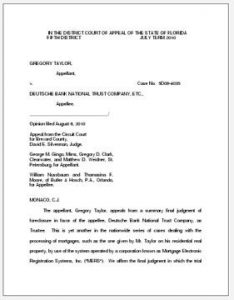 When the appellate decision in Taylor v. Deutsche Bank was published out of Florida’s 5th District Court of Appeals a few months ago, it seemed like an absolute disaster, an utter failure for all of us in the defense community. Well, like some especially sweet “failures”, when this “failure” is understood and studied properly, you can turn it into a slam dunk, knock out punch in your cases.
When the appellate decision in Taylor v. Deutsche Bank was published out of Florida’s 5th District Court of Appeals a few months ago, it seemed like an absolute disaster, an utter failure for all of us in the defense community. Well, like some especially sweet “failures”, when this “failure” is understood and studied properly, you can turn it into a slam dunk, knock out punch in your cases.
Here’s the deal. The decision is absolutely absurd. It represents a dramatic departure from not just a long history of property and the law governing negotiable instruments. It also represents a profound and dramatic expansion of the entire purpose and function of MERS. To me it represents a court desperately struggling to fix an industry’s problems through judicial decision.
The decision grants to MERS rights and abilities that it never intended to have and never before asserted. Especially in light of the depositions that have been released and the widespread abuses of the foreclosure mills, we can all see just how absurd this decision is.
The decision stands for the proposition that MERS can assign both the Mortgage and the Promissory Note, two separate and distinct legal documents that carry with them two separate and distinct sets of laws and rules (at least until this decision which improperly blended and blurred all of these).
Anywhoo, the Plaintiffs attorneys cheered and the foreclosure mills and the document mills have gone to work, just assigning away mortgages. (I guess they just abandoned all their endorsement stamps.) Well here’s where things get good for us. What happens when the Plaintiff has endorsed the note to one party, then they concoct or fabricate a MERS assignment to another party? That folks is s fundamental and unresolvable conflict that they cannot work their way out of.
So here’s how you use it in your cases…when you’ve got a note endorsed to one party and a MERS assignment to another, their case is over and you’ve got a great case for summary judgment.

As I reviewed the appellate case, a few issues stuck out like a sore thumb:
1. The 5th DCA states in its opinion “…This is yet another in the nationwide series of cases dealing with the processing of mortgages..” Thereby recognizing the national importance of the issues before it, but denied the appellant’s motion to certify the case to the Fla. Sup. Ct. :
https://199.242.69.70/pls/ds/ds_docket
2. The 5th DCA cherry picked to hear this case despite the lack of a transcript of the trial court’s summary judgment hearing (The 5th DCA routinely denies appeals due to a lack of a hearing transcript).
3. The 5th DCA’s judicially activist opinion ultimately opens up the pandora’s box of contractual polygamy which will in turn spawn more litigation – a complete devolution of Anglo-American jurisprudence.
Hundreds of years ago, these issues had been put to rest by the solemnization and recording of important contracts like mortgages and marriages because the property rights of the respective parties were too important to be clouded by multiple parties claiming the same interest in the same contract.
To demonstrate the absurdity of the 5th DCA’s opinion, imagine if a MERS system were to be set up amongst husbands and wives wherein the parties only need to get married once. Then, without the need for divorce and the re-issuance of another marriage license, the parties could merely assign their interest in the marriage to another party within the MERS pool.